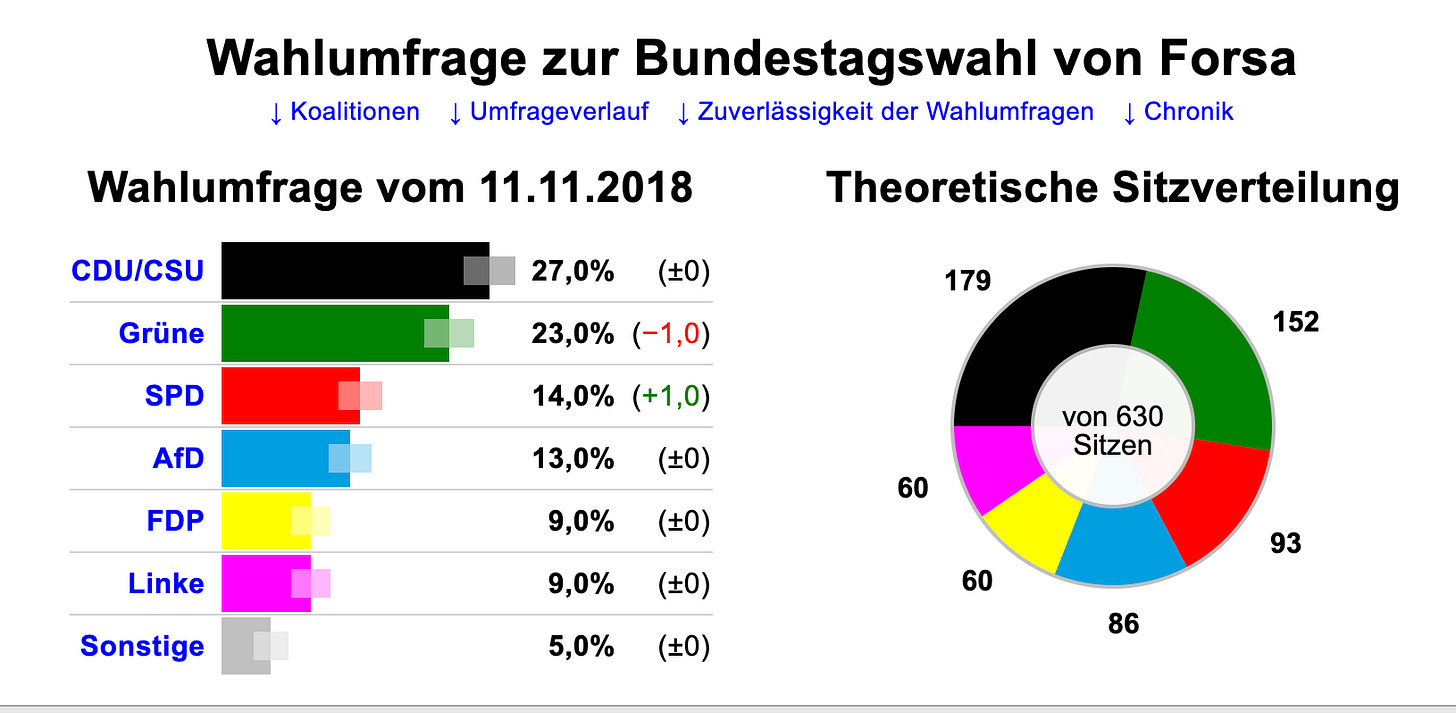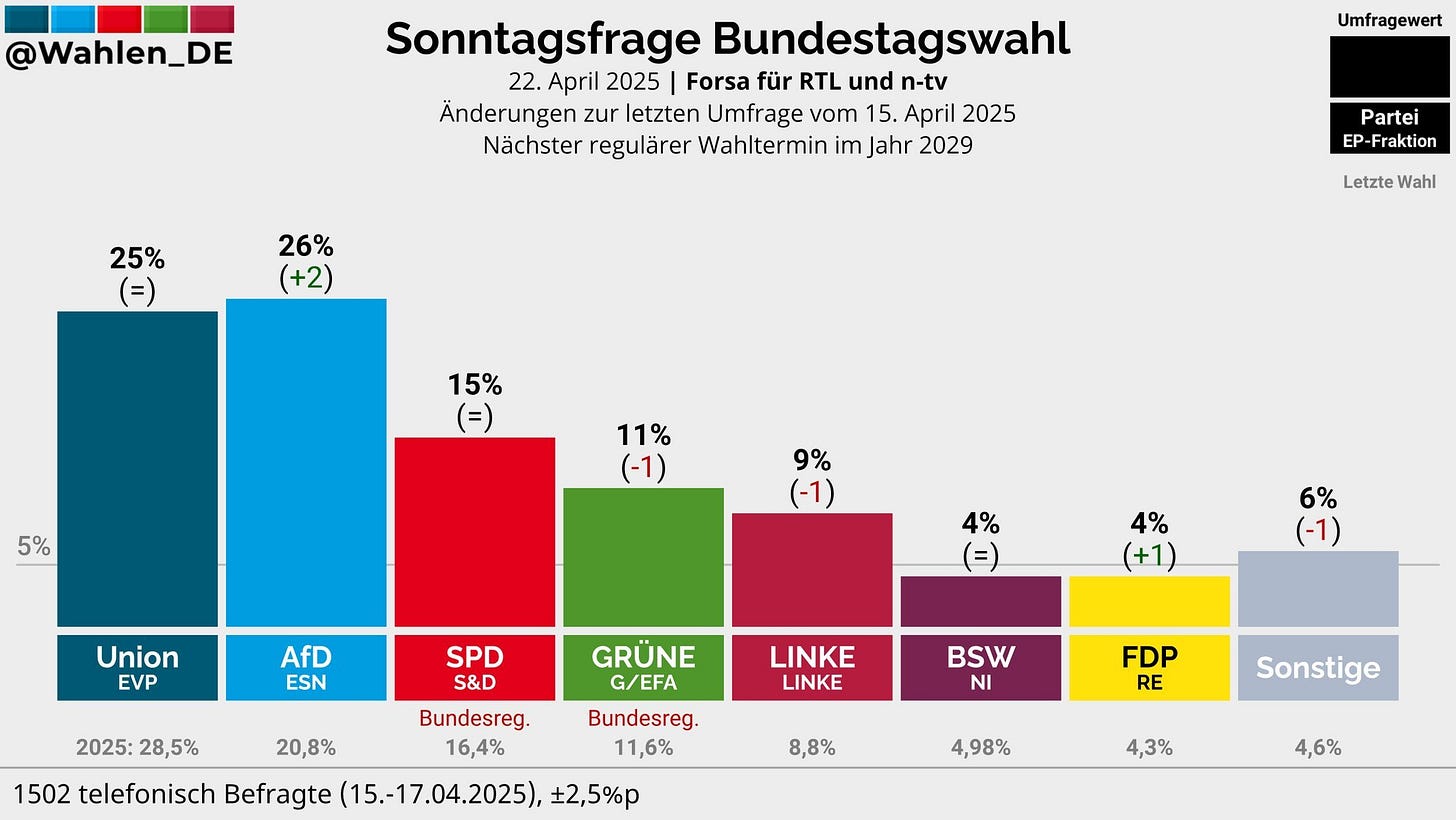Many years ago – in 2018, to be precise – a man named Friedrich Merz was in the running to succeed Merkel as chairman of the CDU.
Merz said many interesting things back then. On November 14th 2018, for example, he gave an interview to BILD, in which he denounced Alternative für Deutschland as a party “that does not distance itself from the Right” and said that “this makes it unsuitable for any coalition”. Merz pledged to win back all the CDU voters who had defected to the AfD over the years. “In the short term,” he said, “it will probably be impossible to get rid of the AfD,” but if he were chosen to succeed Merkel, he pledged that he could “cut their support in half”.
The very next day he tweeted the exact same thing – promising to lead the CDU back to 40% in the polls and to “halve the AfD”.

At a regional CDU conference around this time, Merz yet again promised to “cut the AfD in half”, adding that “this really is possible”. If I looked harder, I could probably find even more examples of Merz repeating this exact same promise. He made it such a core component of his campaign for the party chairmanship that the Frankfurter Allgemeine Zeitung observed in retrospect: “The whole idea of Merz as party chairman was based on the notion that he would win back votes that Angela Merkel had lost.”
While Merz was making all of these lofty promises, the AfD was polling around 13%, at least according to Forsa:
Half of 13 is 6.5, and so we can say that in 2018, Merz was promising to make the AfD a 6.5% party. Alas, Merz was not elected chairman of the CDU in 2018, so nobody quite got around to halving the AfD. The office went first to the absurdly named if otherwise forgettable Annegret Kramp-Karrenbauer. The AfD indeed took a hit on Kramp-Karrenbauer’s watch, but that had everything to do with Covid and nothing to do with this particular pinched woman. Next to the chairmanship came the plump and ineffectual Armin Laschet, who likewise failed to make the AfD a 6.5% party, although the man did have a hand in halving support for his own party, which is something I guess.
Anyway, since late 2021 Merz has been the CDU Chairman, and I have noticed a funny thing about his statements in this period. For some reason Merz has altogether ceased pledging to cut AfD support in half. All of those words from 2018 – they are just totally forgotten now. Perhaps it has something to do with the fact that the more German voters learn about Merz, the further Merz slips from his goal of driving the AfD into that promised irrelevance.
Today, Germany achieved a significant milestone in this regard. After six weeks in which Merz has trashed every last campaign promise he made while also promising to make everything vastly more expensive in hopes of slightly altering the composition of atmospheric gases, the AfD polled not at half of their 2018 numbers, but at double them.
The latest Forsa poll (conducted for RTL and ntv) has Alternative für Deutschland at a cool 26%. That is its best result in history, and it makes it the strongest party in the Federal Republic. This is the second such poll that places AfD in first place, following an Ipsos survey from April 9th that pegged it at 25%.
Merz has indeed done something to AfD support involving the operand of two. It’s just not exactly what he imagined.
Now all of that rhetoric we one once heard from the cartel parties – about the importance of dealing with the AfD on the issues and of making convincing appeals to the “democratically inclined” among AfD voters – has become yesteryear’s pablum. Nobody cares about that anymore. Because they can’t beat AfD on the issues and AfD voters are never coming back, they’re going to try to ban the AfD now instead. A lot of these people truly believe that Germans shouldn’t be allowed to cast their votes beyond the narrow confines of the political cartel that runs the Federal Republic, so they’ll try to try to remove the opposition from the board entirely, via legal trickery.
It’s coming, and I’ll write more about that tomorrow.
This article originally appeared on Eugyppius’s Substack newsletter. You can subscribe here.















To join in with the discussion please make a donation to The Daily Sceptic.
Profanity and abuse will be removed and may lead to a permanent ban.
Yes baby no need to shapeshift just be yourself. Putting a banker in charge at a time like this is the simulations way of kicking things into a higher gear.
A phenomena Canada will no doubt soon bear testament of as well.
And BlackRock Asset Management director.
More here, with the Leftards getting their knickers in a knot over the popularity of the AfD, so much so that their version of ‘democracy’ ( otherwise known as ‘authoritarianism’ to everybody else ) dictates they wish to ban the alleged ‘anti-democratic’ party;
”The Alternative for Germany (AfD) has hit a historic watermark, and is now the most popular party in Germany for the first time ever, reaching 26 percent. The poll, from Forsa, shows the Christian Democratic Union (CDU) in second place with 25 percent.
If the vote were held today, the two parties set to enter government, the Social Democrats (SPD) and the CDU, would not have enough votes to enter government.
The news comes at a time when the left is racing to vote on a ban on the AfD in the German parliament, the Bundestag.
The issue could lead to a major split in the coalition between the CDU and SPD. SPD Bundestag member Ralf Stegner told Welt his party has “absolutely no sense of humor” on any attempt to go easy on the AfD.
”Anyone who wants to form a coalition with the SPD cannot join forces with right-wing radicals. And joining forces also means voting for enemies of democracy,” he said. The MP, known for his left-wing views, instead is calling for a ban on the AfD if the Federal Office for the Protection of the Constitution (BfV) classifies the party as “confirmed right-wing extremist.”
“If the Office for the Protection of the Constitution upgrades its classification, then we also have a duty to work towards initiating a ban on the party,” Stegner said.”
https://rmx.news/trending/the-afd-is-now-the-most-popular-party-in-germany-for-the-first-time-ever-all-while-debate-rages-over-an-the-party/
“If the Office for the Protection of the Constitution upgrades its classification, then we also have a duty to work towards initiating a ban on the party,” Stegner said.
The words in these sentence seems to have gotten shuffled around by accident. Surely, it was supposed to be
“If we want to ban a party, the Federal Agency for Protection of the Constitution has a duty to work towards classifying it as confirmed right-wing extremist,” Stegner said.
Which strongly suggests that this guy hasn’t done his homework. The criteria for banning a party in Germany are, according to the Federal Constitutional Court
As true democract, Stegner is obviously salivating while thinking about the possibility of banning voters from voting for political competitors of the SPD and other left-wing parties.
But this seems to have affected his facilities for reasoning, assuming he ever had any.
¹ If democracy means government of the people, why are they prohibited from chosing how they want to be governed?
They call it ‘freiheitsangst’ this unspoken aspect of the German character. They really are screwed up. Half of their industry is moving abroad to countries with cheaper energy. Germany has a well-devoloped but deliberately limited industry. You excel in these things and keep your nose out of anything else. This is an immense vulnerability imposed by the Anglo-Americans from the outset.
Here’s some German character for you.
A vice-sergeant from our artillery-regiment rode up to me. “Did you see any tanks?” “Yes, earlier, down by Juvincourt, but I guess they won’t be there anymore.” Turning round, I cried “There, there! By the tall trees!” He halted his horse, raised the spyglass to his eye, “Ah, yes, thank you!” and gallopped away. Suddenly, a field-hare-battery dashed into the open from behind the brigadier wood. Lightning-fast, the guns were readied without even leading the horses aside. A furious quick-fire smashed into the Miette-ground where the five tanks were apparently stuck. A magnificent scene: One by one, they were engulfed in explosions and burst into fire, all five of them burning like tinder. At a moments notice, the firing ceased and the canons were reattached to their carriers. The skinny, emaciated horses tore into the ropes and – as if nothing had happend – the battery again vanished behind the trees. Just the vice-sergeant smiled and nodded with a finger held to his helmet when I shouted “Bravo, field-hares, bravo!” over to them. This must have been over in less than five minutes. Truly uplifting. Well, Monsieur Crapaud, we’re still here, too.
[Hans Zöberlein, Der Glaube an Deutschland, Battle at Aisne 1917, translation by me]
He also can’t wait to start WW III…but luckily forgot to order the weapons needed.